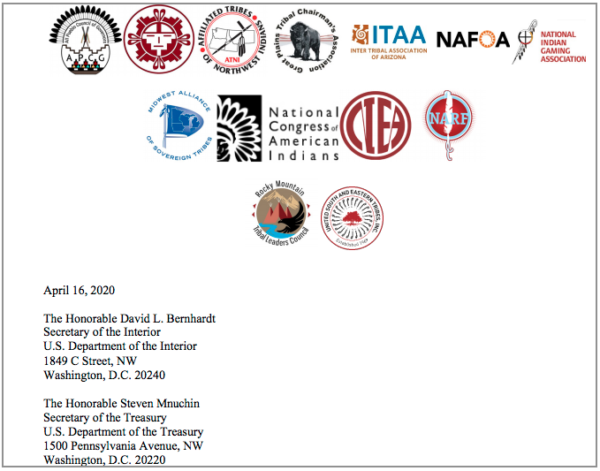
- Details
- By Levi Rickert
WASHINGTON — Tribal leaders and Indian Country advocates are calling on federal agencies to ensure that an $8 billion Coronavirus Relief Fund (CRF) is paid only to Tribal governments and not for-profit corporations. They’re also demanding that Assistant Secretary for Indian Affairs Tara Sweeney recuse herself from the process.
In an extraordinary letter signed by every major Inter-tribal organization in the lower 48 states, more than a dozen national and regional tribal organizations urge the U.S. Department of Treasury to disburse CRF funds “directly and exclusively” to Tribal governments. The letter urges the Treasury not to disburse CRF funds to regional or village Alaska Native Corporations (ANCs), which are owned by shareholders.
Collectively, the 13 organizations represent almost every federally recognized tribe in the lower portion of the United States. The letter in itself is historic in that the 13 organizations have never sent a joint letter to voice collective concerns on any issue impacting Indian Country.
At issue is the Coronavirus Aid, Relief, and Economic Security (CARES) Act provision that designated $8 billion to American Indians tribes to respond to the COVID-19 pandemic and continue to provide essential government services.
Earlier this week, the Treasury decided, after consulting with the Department of Interior, that shareholder-owned ANCs would be eligible to apply for some of the billions earmarked for tribes in the CARES Act. The decision was denounced by tribal leaders, who claimed Congress intended the funds to go to federally recognized tribes, including Alaska Native tribes, rather than for-profit corporations.
In yesterday’s letter, which is addressed to Interior Secretary David L. Bernhardt and Treasury Secretary Steven Mnuchin, the 13 inter-tribal organizations write: “The undersigned organizations feel obligated to communicate to Secretary Mnuchin the gravity of this decision. This is not a one-off decision that the Treasury can make with minimal unintended consequences.”
The letter explains that recognizing ANC boards of directors as similar to tribal governing bodies “completely misrepresents the breadth and meaning of tribal governance. This is categorically incorrect and diminishes the stature of federally recognized tribal governments and our sacred government-to-government, nation-to-nation, sovereign-to-sovereign relationship.”
The letter also accuses the DOI of failing to protect tribal interests and failing to properly communicate the legal nuances and issues to the Treasury.
The letter also demands that Sweeney recuse herself from “all actions and decision-making related to ANCs, including the CARES Act funds.”
Sweeney, an Alaska Native and former executive at the state’s largest ANC, has come under fire this week after some tribal leaders accused her of diverting emergency Tribal Government resources to state-chartered, for-profit corporations owned by Alaska Native shareholders, including Sweeney and her family.
A spokesperson for the DOI denied the allegations, calling them “completely false.”
The following organizations signed the letter: the Affiliated Tribes of Northwest Indians, the All Pueblo Council of Governors, the Great Plains Tribal Chairmen’s Association, the Inter Tribal Association/Council of Arizona, the Midwest Alliance of Sovereign Tribes, the Rocky Mountain Tribal Leaders Council, the Native American Rights Fund, the USET Sovereignty Protection Fund, the Association on American Indian Affairs, the National Congress of American Indians, the National Indian Education Association, the National Indian Gaming Association and the Native American Finance Officers Association.
Tribal Leaders Call for Asst. Secretary Tara Sweeney’s Removal from Indian Affairs Post
More Stories Like This
Native News Weekly (August 25, 2024): D.C. BriefsUS Presidents in Their Own Words Concerning American Indians
Two Murdered on Colville Indian Reservation
NDAA passes House; Lumbee Fairness Act Advances
NFL, Vikings to Host Native All-American Game, Youth Flag Clinic
Help us defend tribal sovereignty.
At Native News Online, our mission is rooted in telling the stories that strengthen sovereignty and uplift Indigenous voices — not just at year’s end, but every single day.
Because of your generosity last year, we were able to keep our reporters on the ground in tribal communities, at national gatherings and in the halls of Congress — covering the issues that matter most to Indian Country: sovereignty, culture, education, health and economic opportunity.
That support sustained us through a tough year in 2025. Now, as we look to the year ahead, we need your help right now to ensure warrior journalism remains strong — reporting that defends tribal sovereignty, amplifies Native truth, and holds power accountable.
 The stakes couldn't be higher. Your support keeps Native voices heard, Native stories told and Native sovereignty defended.
The stakes couldn't be higher. Your support keeps Native voices heard, Native stories told and Native sovereignty defended.
Stand with Warrior Journalism today.
Levi Rickert (Potawatomi), Editor & Publisher

